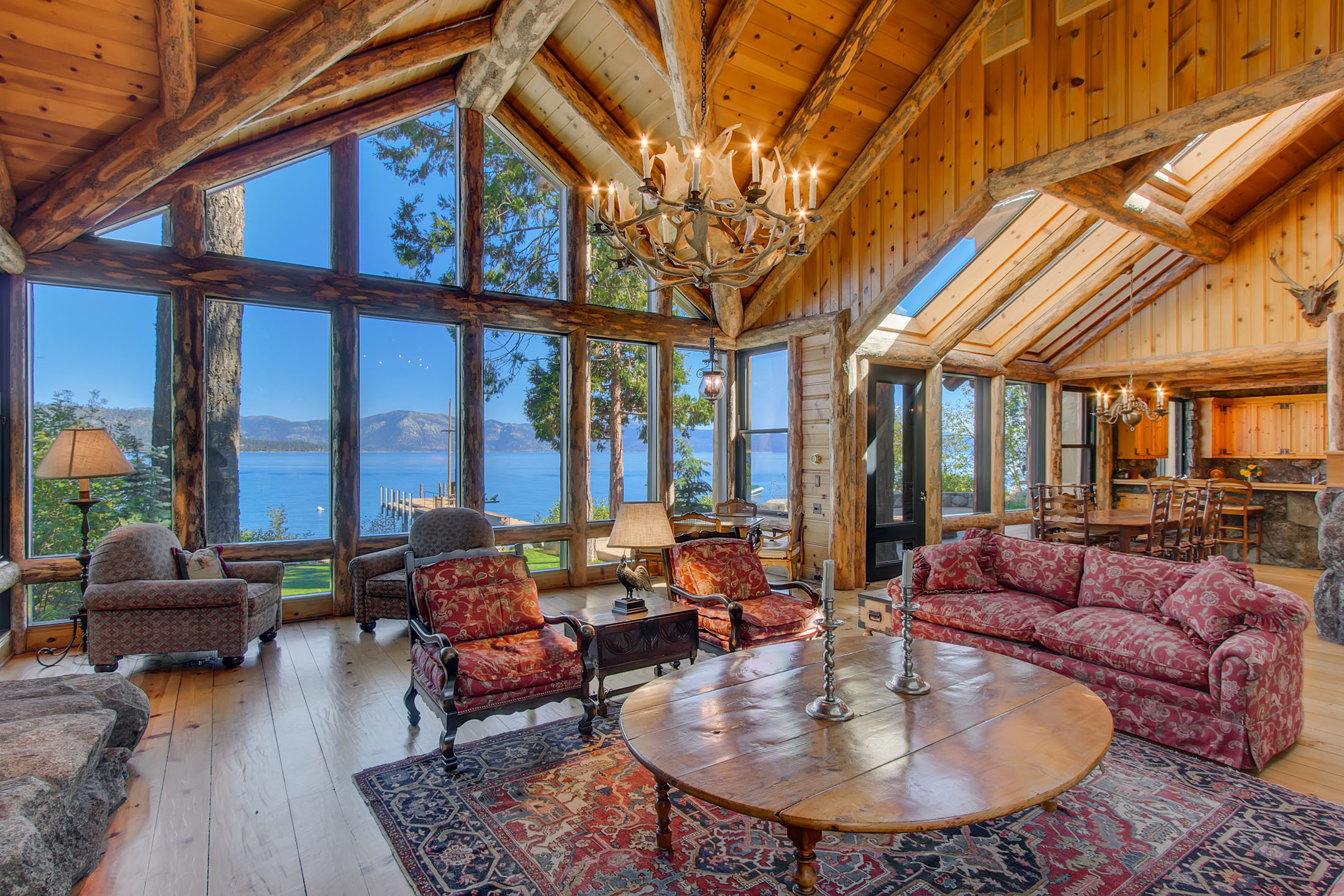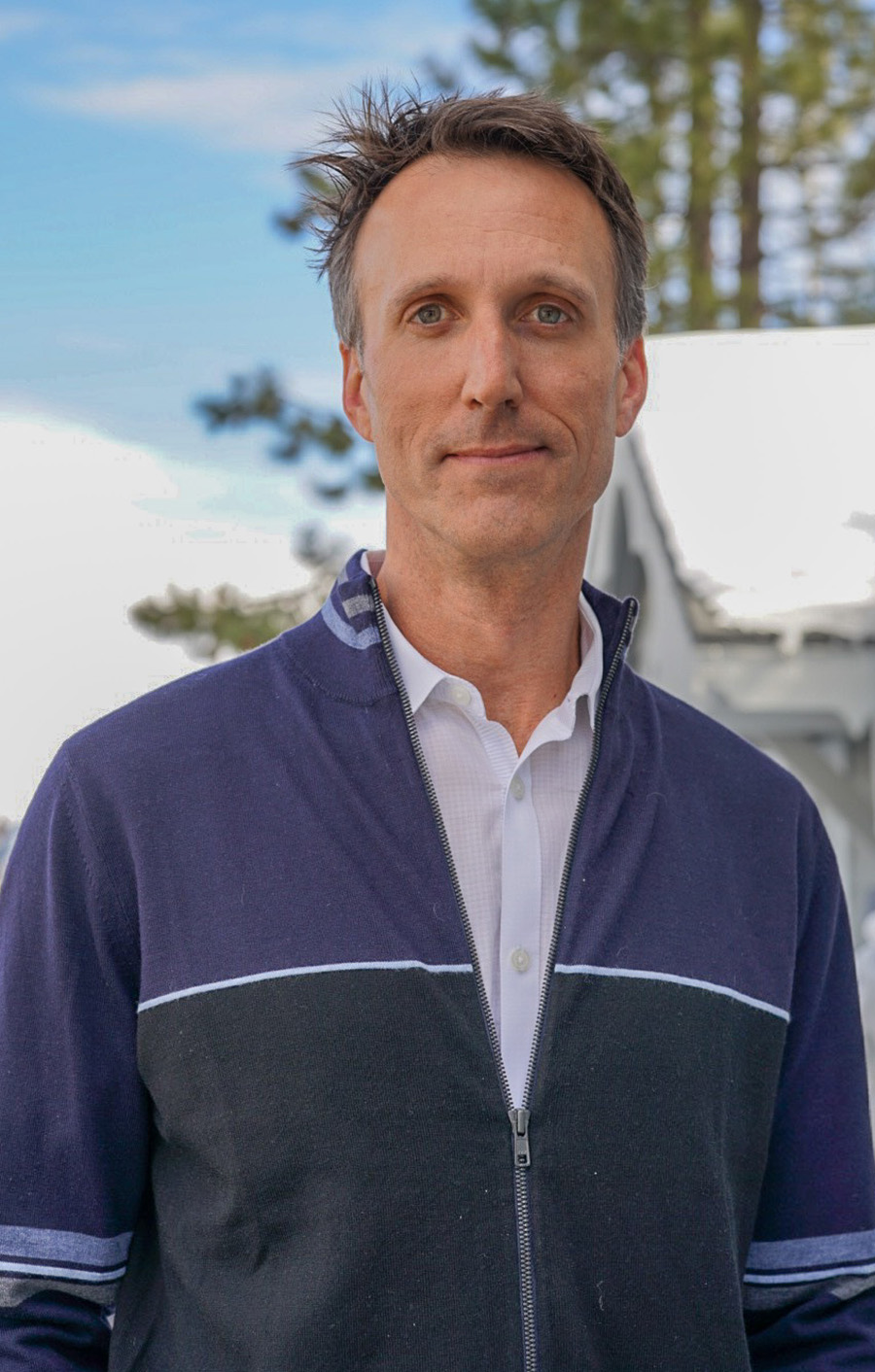Bill Dietz fell in love with Lake Tahoe as a young man, and knew he would do whatever it took to make the magical ski destination his forever home. He started off as the quintessential ski bum, became a local ski instructor, and worked in carpentry during the summers. The interest in carpentry led to flipping houses, which led to the discovery that Lake Tahoe had a missing niche in the mid-‘90s—it was inundated with vacation properties that were less luxury and more Grandma’s basement.
Bill and his wife seized the opportunity for demand and launched Tahoe Luxury Properties, dominating that marketplace ever since by specializing in full-service luxury real estate along with premier vacation rentals. We sat down to pick his brain on Tahoe’s unique market dynamic, how the rise of Airbnb didn’t hurt but actually helped, and how real estate in a mountain town differs from the typical metropolis.
Jenna Marie Bostock: How did you end up in Lake Tahoe?
Bill Dietz: I have a classic Tahoe story. Once I found Tahoe I was here. I’m originally from the Bay Area, north of San Francisco. I started skiing in my teens, my parents weren’t big skiers. We didn’t have a lot of money growing up, so it was just tag along with a friend thing. One of my best mates had a family cabin in the Sunnyside area, so I was able to ski a bit through high school. Then I got the bug and said boy, I am all about Tahoe. I want to do this. I started as a ski instructor, teaching at Alpine Meadows, and in the summers I worked at a construction company ultimately as a carpenter.
Jenna Marie Bostock: Did you have any real estate experience when you started TLUXP, or did you and your wife just decide to jump into it?
Bill Dietz: My experience really came from the construction work I had done in the summer. I was a carpenter when the lifts weren’t spinning, so I learned how houses were put together.
We did some projects early on where we bought houses and sold them and made some money from the investment side and got really excited about it. Then once we started getting into the property management side of it the real estate angle really grew and we continued to pursue that avenue aggressively. We do our own investments on the side, 3-4 separate houses. It’s fluid, because we’re always buying and selling things. Some we’ll keep for long term holds to pass down to our kids at some point in time, some of them are more shorter term investments that we can spin and parlay into something else.
Jenna Marie Bostock: Tell me about the inception of Tahoe Luxury Properties.
Bill Dietz: My wife is really the primary person who is responsible for the founding of the company. We run it together. We discovered a niche that there was a need for high-end vacation rentals that affluent and everyday people who were looking for nicer accommodations in a private setting, and no one was doing it. It was just those classic vacation rentals where it was Grandmas house with the green shag carpet and the orange couch. it was the total ski crash pad, that was the market for vacation rentals at the time. There weren’t really any luxury accommodations available in the Tahoe area at the time, especially in a private setting.
At that point, we started with one house and started renting it out. We grew one house at a time, ultimately grew into what it is today. For six years it was exclusively a rental company, and then we recognized that once you have an inventory of vacation homes you have owners who want to sell them and renters who want to buy them, so it was a natural progression to move into the real estate business.
The renters often turn into buyers, the renters turn into sellers. They become renters when they sell the house. It all comes full circle.
Jenna Marie Bostock: How did you fund Tahoe Luxury Properties originally?
Bill Dietz: It was funded entirely organically through my wife and myself and by growing the business house by house. We self-funded. Not because we had a pile of money, but because we had a business and we had costs that were very low, we were able to keep ahead of it. We’ve never had any outside funding for the business, and keep the control.
Jenna Marie Bostock: What was the vision for the brand?
Bill Dietz: The whole vision and mission for what we do is to create an experience much like you would see in a boutique hotel, but instead of having one property where you are confined to very small quarters like a traditional hotel room we do it in the format of a large house. We want to create an experience much like you would want out of your own home, but better.
That’s the format that we embrace. To share a high end level of service through and through. We have full service concierge, much like you would experience at a nice high end hotel.
Jenna Marie Bostock: Is it a pretty saturated marketplace here now? Talk to me about any hurdles you encountered when you first launched.
Bill Dietz: Not when we first started. We saw a huge growth curve for the first fifteen years of the business. We saw a very steady, strong, upward curve. We rode it, it was awesome. And it’s still very good. Yes, we’ve had our challenges.
Our challenges now are the OTA, the online travel agents. That encompasses Airbnb, VRBO, Expedia, all of these large travel companies that are online have created somewhat of a saturation in the market. They’ve created a space that’s become very easy for people to enter into that market. Before, it was more of a ‘I don’t want to talk to a property management company, I want to deal with it on my own’ attitude, but they didn’t have the resources or avenue to do it. Now they’ve got it.
That creates both challenges and opportunities for us. Now what we’re seeing is that people are becoming much more comfortable renting houses, where they never used to be. They were very comfortable just going to the Ritz or the Four Seasons, it spooked them to rent someones house. Airbnb has become a very large significant force in the business, and what it’s done for us is it’s allowed people who are traditional high end travelers that would’ve ended up at a Ritz-Carlton hotel room saying ‘Well, it makes a lot of sense to rent a house instead of a small hotel room.’ It’s helped us in that regard.
We were concerned initially, once they gained a whole bunch of momentum. It started with VRBO, and then Airbnb got into the space and blew it up. We were concerned that they were going to suck all of our business away, and that has not been the case. We decided ultimately we were going to jump along with them. We’ve put the vast majority of our inventory advertised through Airbnb and through VRBO and it’s grown the business in ways we didn’t imagine.
Jenna Marie Bostock: How do you think the vacation town industry differs from the typical metropolis real estate world?
Bill Dietz: It’s an interesting dynamic. It’s a vacation destination, it’s a secondary purchase, there’s no urgency. Our market is much slower than you might be used to. What we see is that because it’s not a need to have purchase people are slower to make decisions, especially when you’re talking about a 3, 5, or 10 million dollar purchase. They want to spend their time to deliberate.
When people start thinking about making a decision in that price range, they’re deliberate about it. Especially here. It’s more of a focus on ‘This is our vacation home, let’s take our time’. That’s the biggest difference in the real estate market of a mountain town versus what you see in normal metropolitan areas like San Francisco.
It can be very seasonal. I’ll show a client a property when they’re here for Christmas, and I may see them maybe one more time that winter season, and then I may not see them again till July or August, and they may make a decision by that fall. It’s really long term thinking.
Jenna Marie Bostock: You got into the industry at the rise of the dot com era—did you foresee how that would help to shape this world or was that a lucky break?
Bill Dietz: Didn’t see it coming at all! In 1994, what we were doing was taking physical photos, going to the photo shop and having them printed, mailing the photos to prospective renter who would then receive them in the mail, pick up the phone, and call us. Ha!
It was a huge cornerstone to our success, embracing technology early on. That was one of our advantages when a lot of people were stuck in that old way of doing things. We built a website, put everything on there and recognized that was really the wave of the future.
Jenna Marie Bostock: What do you think makes Tahoe so special and sets it apart from the Jackson Holes and Tellurides of the world?
Bill Dietz: The things that differentiate Tahoe the best is both the winter and summer appeal. People come to Tahoe for the winter and they stay for the summer. You spend a July here and the weather is perfect, there’s a great big lake that offers all the great water sports, boating, fishing, water skiing, wake boarding, all that stuff is great. Then all the mountain biking. There’s this great compliment of summer mountain activities around a great body of water that’s beautiful and clear and clean and fresh and wonderful.
It’s also the proximity to other things. People buy in Tahoe not because they want to just be in Tahoe but they like the idea that they’re a 3 hour drive or a half day drive away from so many great destinations in California. You’ve got Yosemite, Carmel, Napa, Sonoma, Monterey. It’s amazing.
Jenna Marie Bostock: A lot of our readers are aspirational entrepreneurs, still working hard to make the hustle happen. What advice would you have for them?
Bill Dietz: Recognize and seize opportunity. Don’t ever be afraid to tell someone what you’ve done for them. Meaning, if you went to a clients house and you noticed something was out of place and you fixed it, don’t just do it. Do it and tell them you did it.
When I look back at all our years of development in this business, the success was born out of being willing to do the hard work and see the idea through. We had the idea early on, there was a need, there was a demand for what we thought we were going to provide, and because we were young, ambitious and didn’t have resources what we had to do the work. We were the ones cleaning the houses, doing the accounting, he concierge work. It was all very hands on. We were a home based business until 2002, about 10 years.
Be willing to do the hard work and show your worth.





